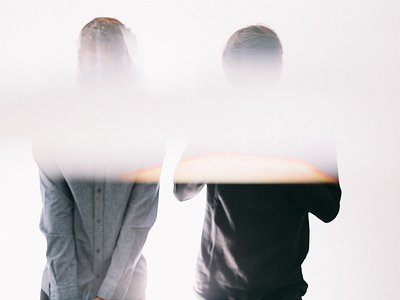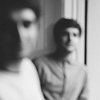Part 1
Name: Francesco Leali (Clockwork), Thomas Feriero (Avatism)
Nationality: Italian
Occupation: Producer
Labels: Parachute
Current Release: Words Unspoken, Acts Undone on Parachute
Musical Recommendations: Dead Fader and Rabit (Francesco). TCF and Vince Staples (Thomas).
When did you start writing/producing music - and what or who were your early passions and influences?
F: I was 14/15 years old when I first started writing music. At the time I was practicing and studying percussion during most of my day and listening to a lot of Rock and Hip-Hop acts like The Fugees, Korn, Limp Bizkit, Alice In Chains, A Perfect Circle, Tool and A Tribe Called Quest amongst others. It was not until I started listening to more electronic music that I decided to try and make my own.
T: I think I was 15 when I learned how to use a sequencer for this grindcore/death metal band. They didn’t have a drummer and needed some beats to practice their songs to and they asked me as they knew I played drums. I was too rusty and had no recording equipment to do anything decent, so I thought I’d try this whole “drum machine” route that was becoming really popular in grindcore at the time. I was actually blown away by how “easy” it was and how good it sounded to me back then. It was loads of fun although I’m not sure I’d even describe what I was doing at the time as “music”, nor was the band serious on any level.
The only really “electronic” music I liked back then were The Prodigy and Kraftwerk, synthy hip-hop like Dr. Dre and while I owned a copy of Apex Twin’s Come to Daddy, I liked it for all the wrong reasons. I mainly listened to a lot of badly-recorded black metal such as Burzum, Bathory and Absu; grind a la Carcass, Napalm Death and Nasum and things like Ulver, Tool, Godflesh, Sunn O))), Eyehategod, Dying Fetus and Katatonia. I guess I was your stereotypical angsty teenager.
When I first started making actual “music” my influences were based on stuff that my friends recommended, as they used to listen to “house” and “techno,” which I knew nothing about but found easier to replicate by myself. It was a bit of everything ranging from Trentemøller to Isolee, from Stephan Bodzin to Apparat, but also a lot of really terrible deep house and minimal techno. To be honest I think musically this was the period when I was listening to the worst music of my entire life … I can still appreciate things like Tool and Darkthrone, and I still love The Fat of the Land and Chronic, but most of those old techno/house records really aged terribly.
For most artists, originality is first preceded by a phase of learning and, often, emulating others. What was this like for you? How would you describe your own development as an artist and the transition towards your own voice?
F: It all started after my twelve years of studying music. I felt this impulse to make something of my own. I was trying to blend my classical studies with the electronic music I was listening to at the time but I lacked courage, initiative and obviously the necessary skills to achieve what I was aiming for. Although I initially had some kind of role model I looked up to it was never about emulating others for me, it was mostly about trying to have my own niche and working my way up from there. When my first record came out I felt it didn’t rightfully represent me or the artist I aimed to be so I rolled with that for a year or so.
I then started to gradually transition away from a scene I didn’t feel comfortable in and this gave me the chance to reinvent myself, go back a few steps and correct where I had previously gone wrong. The CW/A project and other things we have going on are a pretty healthy example of how this process worked out for us.
T: When I started making music I was too young and stupid to know anything about identity and making things with meaning: I admit I just thought making music “was cool” and something I wanted to do. I definitely went through a copycat phase but eventually started appreciating the “artist” side of it all. I think the 2013 Avatism LP Adamant was the first step towards creating my own personality, but — pressured by agents, labels and my own fears — I couldn’t really do exactly what I wanted. I don’t think I would’ve had the skills to “do it right” back then anyways, so I am glad I was pressured into sticking some older 4/4 tracks on there, as those made sure the record sold some copies.
I have a lot of unreleased music that I think is a lot more personal than the records I have put out but I think having your own voice isn’t everything: it’s useless if you’re speaking a language nobody understands. I believe this is what we wanted to do with CW/A: start fresh and do something we are 100% proud of.
What were your main compositional- and production-challenges in the beginning and how have they changed over time?
F: I’d say the whole process of writing music was challenging for me. I would throw down drum loops in no time but would get stuck immediately after that. I also had very little mixing knowledge so my stuff wasn’t sounding too good either. Initially I also had this misconception of having to make music that had to fit in a certain place or time and that, too, gave me a fair amount of limitations. It was only after I decided to completely de-contextuaize myself from any musical sub-culture that things started to work out for me. The fear of people not liking your work as well as feeling constantly judged was preventing me from getting better at writing; at the time I was associated with a scene that despised artists for trying to be different and for a moment I stupidly thought that was right, until I snapped out of it and decided to leave that unhealthy thinking process behind and go for what I felt was the right thing to do. Going against the grain wasn’t easy, but it helped me in so many ways, one of which was writing music.
Tell us about your studio, please. What were criteria when setting it up and how does this environment influence the creative process? How important, relatively speaking, are factors like mood, ergonomics, haptics and technology for you?
T: I just recently finished setting up my new studio, and it’s been a real paradigm shift. The place we wrote and produced our Words Unspoken, Acts Undone album in was pretty awful (although we we were used to it), and it’s been really weird to move into this mastering-grade environment where everything is suddenly “pro.”
I think what urged me to make the move was wanting to explore things more freely, without the limitations you have in a rough environment: in here we can work at any time, any volume and for as long as we want and it just sounds amazingly good. It’s hard to believe we were making music in such terribly-sounding rooms before.
Sound and technology aside, it’s hard to tell how important mood and ergonomics are as we just moved in. Most of the music we’ve produced so far was done in terrible situations with awful lighting and broken chairs and while having finally upgraded from this definitely feels good, we’ve yet to see whether it has any impact on the work itself.
What are currently some of the most important tools and instruments you're using?
T: Room treatment really makes the difference, more than any other piece of gear I’ve ever bought. Doing it properly can be expensive but it’s definitely worth it. Signal processors like the Lexicon 224, Roland Space Echo, ATR-102 and Slate Digital plug-ins are a close second in terms of importance, while the Nord Lead 2X and classic Arturias tend to be our go-tos when drafting ideas.
Many contemporary production tools already take over significant parts of what would formerly have constituted compositional work. In which way do certain production tools suggest certain approaches, in which way do they limit and/or expand your own creativity? Are there any promising solutions or set-ups capable of triggering new ideas inside of you as a composer?
T: It’s hard to pinpoint what can limit creativity (and how) but I agree: different approaches lead to different results. The best things we’ve ever done weren’t too planned out so I think the key for us is switching things around as much as possible. Sometimes we work almost entirely in the box, while other times we’re just jamming on synths and drum machines, recording everything. We tend to arrange and mix with Logic so something like occasionally switching over to Ableton, Reaper or even some random iPhone app can trigger new ideas.







